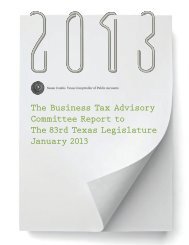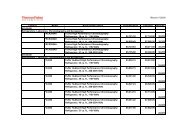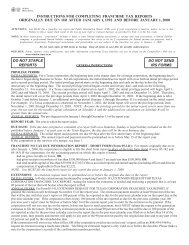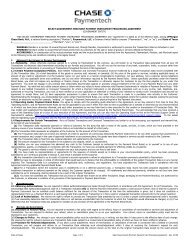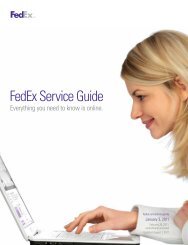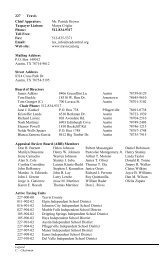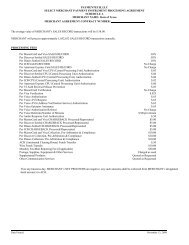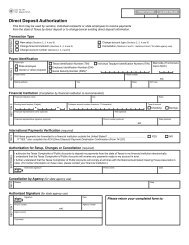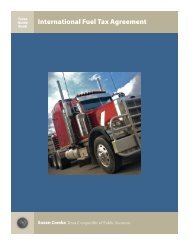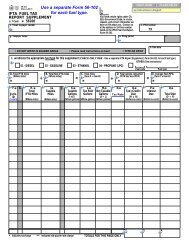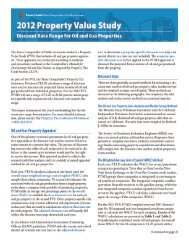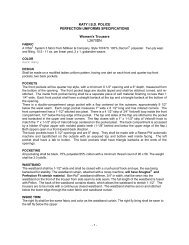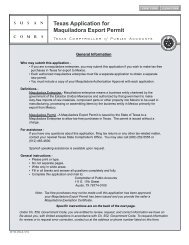Contracts Management Guide - Texas Comptroller of Public Accounts
Contracts Management Guide - Texas Comptroller of Public Accounts
Contracts Management Guide - Texas Comptroller of Public Accounts
Create successful ePaper yourself
Turn your PDF publications into a flip-book with our unique Google optimized e-Paper software.
The best contract for the state does not necessarily mean squeezing every advantage out <strong>of</strong> the contractor. While<br />
onerous and unnecessarily harsh provisions may be legal, they usually have negative future consequences that outweigh<br />
the initial gains. Contractors who feel they have been aggrieved by the state are less likely to provide good service and<br />
are more apt to engage in legal action. Or these contractors may decide to never contract with the state again thus<br />
limiting future competition on state contracts. In addition, contractors who are informed by other contractors <strong>of</strong> bad<br />
experiences with the state may demand more money on future contracts to do the same work to <strong>of</strong>fset the perceived<br />
risk.<br />
Drafting the Contract<br />
<strong>Contracts</strong> usually include a variety <strong>of</strong> terms and conditions <strong>of</strong>ten referred to as ‘boilerplate’ or ‘standard’ terms and<br />
conditions. While many contracts produced by agencies include similar terms and conditions, historically there have<br />
been no generally accepted terms and conditions for use by all state agencies. This chapter <strong>of</strong> the <strong>Guide</strong> provides<br />
generally accepted terms and conditions for use by all state agencies. Agencies should keep in mind that these are<br />
recommended terms and conditions and unless otherwise specified, may be modified to meet the agency’s need.<br />
A particular business entity or agency that repetitively contracts for the same or similar goods or services may develop<br />
a contract with terms that are standard for a specific transaction. These standard terms are usually the product <strong>of</strong> years<br />
<strong>of</strong> experience and are typically designed to favor the party drafting the contract.<br />
Except for contract terms that are contrary to public policy that may be void, voidable or severable from a contract,<br />
the types <strong>of</strong> contract terms that may be included in a contract are only limited by the creativity <strong>of</strong> the drafter. The<br />
appropriate terms to include in a contract are the terms that fully describe the actual agreement <strong>of</strong> the parties. There<br />
are types <strong>of</strong> provisions that are typically included in contracts, including but not limited to:<br />
1. Administrative provisions;<br />
2. Financial provisions;<br />
3. Provisions that allocate risk;<br />
4. The statement <strong>of</strong> work;<br />
5. Provisions relating to the contract term, termination and dispute resolution; and<br />
6. Provisions that relate to rights and ownership <strong>of</strong> work product and intellectual property.<br />
Planning for the Contract<br />
Just like other contract management processes, an agency should plan for drafting the contract. A common practice is<br />
to include a draft <strong>of</strong> the standard agency contract in the solicitation document. This allows a potential contractor to<br />
make an <strong>of</strong>fer with knowledge <strong>of</strong> the proposed contractual terms and conditions. As a practical manner, during the<br />
RFP process, it may be difficult to prepare a draft contract with a detailed statement <strong>of</strong> work due to the potential for<br />
negotiation. Be sure to plan for adequate time to prepare the final contract.<br />
The planning effort could begin by collecting and reviewing similar contracts used by other agencies. Do not<br />
automatically adopt terms and conditions from another contract without a thorough and independent review <strong>of</strong> how<br />
the terms and condition relate to the current procurement. Studying risks, contracting objectives, assumptions and<br />
constraints in other contracts may be helpful. Another method to plan for a contract is to prepare an outline<br />
containing headings for the major terms, conditions and provisions. This makes it easier to group related terms and<br />
conditions. An outline will also illustrate gaps in the structure <strong>of</strong> the contract. Finally, allow adequate time for an<br />
attorney to address potential legal issues.<br />
54



